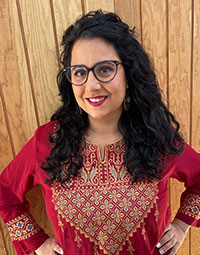
Ethnic Studies
Ethnic Studies Speaker Series
Wednesday, May 22
Speaker Panel: Overlapping Histories — A Dialogue on Borders, Solidarity, and Ethnic Studies
Noon–1 p.m.
On Campus: Room 8338 | Refreshments provided.
Register for Zoom Option
(Note: Zoom registration link updated 5/20/2024)
Presented by Foothill College Ethnic Studies Department
Meet Our Panelists
Read about each panelist's talk and bio below.
Dr. Yen Le Espiritu
 So much of the scholarship and public discourse on migrants and refugees in the U.S.
is framed from the perspective, logic, and needs of the nation state, which relegates
refugees’ interests, desires, and needs as secondary considerations. The language
of “refugee crisis” and “migrant invasion” depicts refugees and asylum seekers as
the cause of an imagined crisis at the border. This presentation will discuss how
migrant and refugee crises are actually the outcome of the actual crises of capitalist
globalization, conquest, militarism, and increasingly, climate change, and reconceptualize
migrants and refugees as a site of political critique, knowledge formation and social
transformation.
So much of the scholarship and public discourse on migrants and refugees in the U.S.
is framed from the perspective, logic, and needs of the nation state, which relegates
refugees’ interests, desires, and needs as secondary considerations. The language
of “refugee crisis” and “migrant invasion” depicts refugees and asylum seekers as
the cause of an imagined crisis at the border. This presentation will discuss how
migrant and refugee crises are actually the outcome of the actual crises of capitalist
globalization, conquest, militarism, and increasingly, climate change, and reconceptualize
migrants and refugees as a site of political critique, knowledge formation and social
transformation.
Dr. Leslie Quintanilla
 The US-Mexico border(s) is a unique site of transterritorial solidarities forged across
communities in struggle. In recent years, social justice movements have proposed
important intersectional frameworks, across what are otherwise seen as compartmentalized
movement spaces, to organize against colonialism, imperialism, and capitalism. This
presentation will situate the San Diego-Tijuana border as an active site of translocal
solidarities between and beyond climate justice, border justice, and land/water justice
activisms.
The US-Mexico border(s) is a unique site of transterritorial solidarities forged across
communities in struggle. In recent years, social justice movements have proposed
important intersectional frameworks, across what are otherwise seen as compartmentalized
movement spaces, to organize against colonialism, imperialism, and capitalism. This
presentation will situate the San Diego-Tijuana border as an active site of translocal
solidarities between and beyond climate justice, border justice, and land/water justice
activisms.
Dr. Jennifer Mogannam

In recent years, the question of whether or not Palestine has a place in Ethnic Studies has come to the fore. This presentation will situate the question of Palestine within the broader field of Ethnic Studies, offer context on why this question is surfacing, and interrogate how Palestine is present in and what Palestine offers to the field. This discussion will center how Palestine relates to key concepts in the field as well as Arab American studies. These key concepts include (settler) colonialism, refugees, transnationalism, borders and more.

